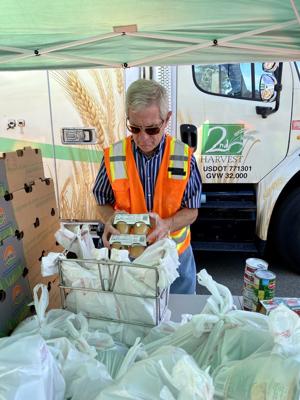
TRI-CITIES, Wash. – The pandemic caused a lot of financial stress on people, forcing them to look to food banks for help. Now with inflation rising, the same thing is happening. However, food banks are now feeling the effects of supply chain issues caused by the pandemic, making it hard for them to keep up with demand.
According to the Chief of Staff for 2nd Harvest, Drew Meurer, food is flowing out of their food banks faster than they are receiving it. This applies to a lot of nonperishable items, which means they’ve had to rely heavily on farmers for donations.
2nd Harvest provides food to 250 food banks across Eastern Washington and Northern Idaho.
The food banks it serves are now getting more perishable items and Meurer said he sees this being the case for several more months.
“We try to work with the sturdier varieties of produce; apples, potatoes, onions and watermelon,” he said. “We emphasis cold chain for us and our partner agencies and we really just work on speed.”
Since much of the food is perishable, they try to get it to the food banks within three days of receiving it. Meurer said quality is a priority.
“We teach our staff we wouldn’t want to distribute anything we personally wouldn’t consume and they take that very seriously,” he said.
One of the places they serve is the Family Resource Center in Tri-cities. FRC opened its food bank during the pandemic as they saw the need for food increase. They primarily serve people with special needs.
In order to better reach their target group, this food bank works a little differently. The Executive Director of FRC Yadira Galvan said it’s set up like a grocery store and people can grab what they need.
“I have kids with autism, so they don’t always eat what other people eat and when you go to a food bank you get a box of cans and you don’t always know if they’ll eat that,” Galvan said.
With 2nd Harvest struggling to get food in, it’s affected their ability to get food to their clients. Galvan said a lot of FRC’s clients use its food bank as their main resource for food, making it even more important for them to keep their shelves stocked.
“A lot of the families that come to us are clients that are undocumented so they can’t receive services like the EBT or that kind of stuff and it’s families that usually fall through the cracks in other places so we wanna make sure that we are serving them,” she said.
Galvan said staff has tried to fill shelves with whatever they have but it is becoming more and more obvious they don’t have big ticket items like canned chicken or tuna.
2nd Harvest and FRC are both reaching out to different businesses to see who is able to donate food. They said the community can also do it’s part to help.
“If everyone donated just a little bit, we would reach the goal to make sure our shelves stay stocked,” Galvan said.
If you can’t donate food, 2nd Harvest and FRC both need volunteers too.
